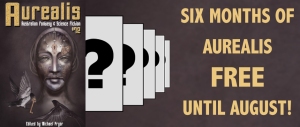We've been staggered by the response to our ABSOLUTELY FREE HALF-YEAR SUBSCRIPTIONS to Aurealis, so we've decided to extend the offer to the end of August! To get your free subscription to the last 5 issues of the year (Aurealis #72 to Aurealis #76), go to the Subscriptions Page.
Month: June 2025
From the Cloud: 10 things Aurealis looks for in submissions
This month, in a fit of positivity, we want to share with you some of the things we look for, the aspects of Fantasy and SF writing that charm us and are likely to get the nod for inclusion in Aurealis, Australia’s longest-running speculative fiction magazine.
- Good writing. By this, we mean more than a simple facility with written English. Even though this is important, it should be a given, a basic expectation of any submission. Rather, we enjoy apposite language, sentences with flexibility and rhythm, dialogue that is alive with character and intonation, complexity of construction and stark simplicity used in the right times and places.
- Voice. This is hard to define, and has much to do with the point above. Your story should sound individual and alive through its narrative point of view.
- Characters. Your main character should be engaging. That’s it in a nutshell. Of course, there are a million different ways to make your main character engaging. You just have to choose the right one and implement it deftly.
- Originality. This doesn’t necessarily mean that your central premise needs to be wildly new, although this is desirable. A fresh take on a well-established concept is good. Quirky, idiosyncratic characters are also useful in upping your originality quotient.
- Conciseness. Be economical with your story.
- Quick movement into the heart of the story. We are a short story journal, which means you don’t have unlimited space to work with. This can be a challenge in Fantasy and SF, where world-building and background detail is important, but do your best. Don’t linger too long in the set-up. You’ll lose us.
- Hard SF. We don’t get enough of these sort of stories.
- Humour—but it has to be really funny.
- Diversity. Think about your characters. Are you making unwarranted assumptions about dominant cultures? Are you overlooking possibilities?
- The X Factor. It could be freshness, it could be the unexpected, it could be something shocking, or it could be something that makes us grin or wince or sit up straight after the first paragraph. We can’t tell you what the X Factor is, exactly, but we know it when we see it. Including it is a good thing.
Aurealis is, and always has been, committed to publishing the finest in Australian speculative fiction. With your help, we will continue to do so.
– Michael Pryor
Before (or after) grabbing your FREE six month-five issue subscription to Aurealis (you’ve got until the end of July!), be sure to pick up a copy of Michael Pryor’s latest page-turner Machine Wars – by clicking the appropriate image below.
Five of the Best for July 26 – The curiouser and curiouser edition
Can you believe it’s been 61 years to the day since Disney first premiered their animated classic Alice in Wonderland? I can’t! It feels like only yesterday I sat in the gloomy main hall of Westgarth Cinema in Northcote for the premiere, my grandchildren either side of me and a box of buttered chestnuts on my lap. This was before robotic organs had been fully perfected mind you, so I was just using my bio-rises, but my hat, what a spectacle.
Catch yourself up on the history of Alice and her wild adventures with today’s Five of the Best.
The Atlantic profiles the girl that inspired Alice in Wonderland.
Which of these 17 AiW adaptations is your favourite?
Was Lewis Carroll actually Jack the Ripper?
Here are 10 things you (probably) didn’t know about AiW – including the truth behind Mock Turtle soup.
Wonderland has its own Wikipedia page! For those who like to get caught down online rabbit holes…
From the Cloud: 20 things learned in 25 years of submissions
Aurealis has a proud history of publishing fiction in Australia. Since our first issue, we have introduced new authors to the reading public and given established authors a means to continue their relationship with their audience.
These are some of the things we’ve learned over nearly twenty-five years of selecting stories for publication.
- If you don’t read in the genre, you’re unlikely to create an original, refreshing genre story.
- One idea is rarely enough to sustain a story.
- Many stories would be far better off if they were a third shorter.
- If you use genre trappings, then your story will end up in the reject pile. ‘Trappings’ implies something added after the event, mere decoration. Respect the genre.
- Short stories are short. Don’t waste time—get into the story.
- If you can’t handle dialogue, your story will suffer badly.
- If nothing happens in your story, you don’t have a story. You might have a vignette, or a mood piece, but we don’t publish vignettes or mood pieces.
- Stories that only have one character can struggle. So much talking to her/himself…
- Don’t submit a first draft. Submit a story that you’ve polished until it glows.
- Clichés are clichés are clichés—and we’re not interested. Whether it’s a clichéd story idea or a clichéd character or a clichéd resolution, we’re really not interested.
- Solid, well-crafted writing beats pretentiousness every time.
- We are well over monospaced fonts. Courier is hard to read.
- If you’re not spelling and punctuating properly, you’re not using the fundamental building blocks of writing. Very few stories show a finely structured, well-nuanced, carefully textured narrative with poor spelling and grammar.
- Genre cred isn’t enough. You must write well on top of that.
- Subtly integrating background detail about the different places and times your story is set in is a major and impressive skill, likely to get our attention.
- Character diversity is a good thing and tends to suggest a thoughtfulness that bodes well for the rest of your story.
- If you jump on a trend from TV or the movies, it’s likely to be too late. We will have seen it a million times by the time your story gets to us—and we’ve probably rejected all of them.
- Surprise endings and shock plot twists rarely are.
- Humour is hard.
- If you don’t read our guidelines, you’re not likely to get published in Aurealis.
– Michael Pryor
Before (or after) grabbing your FREE six month-five issue subscription to Aurealis (you’ve got until the end of July!), be sure to pick up a copy of Michael Pryor’s latest page-turner Machine Wars – by clicking the appropriate image below.
Aurealis announces FREE HALF-YEAR SUBSCRIPTIONS for 2014
As part of Aurealis magazine's upcoming celebration of 25 years of continuous publication, Aurealis is offering an ABSOLUTELY FREE HALF-YEAR SUBSCRIPTIONS for 2014. To get your free subscription to the last 5 issues of the year (Aurealis #72 to Aurealis #76), go to the Subscriptions Page. Hurry, the offer is only open until the end of July!



